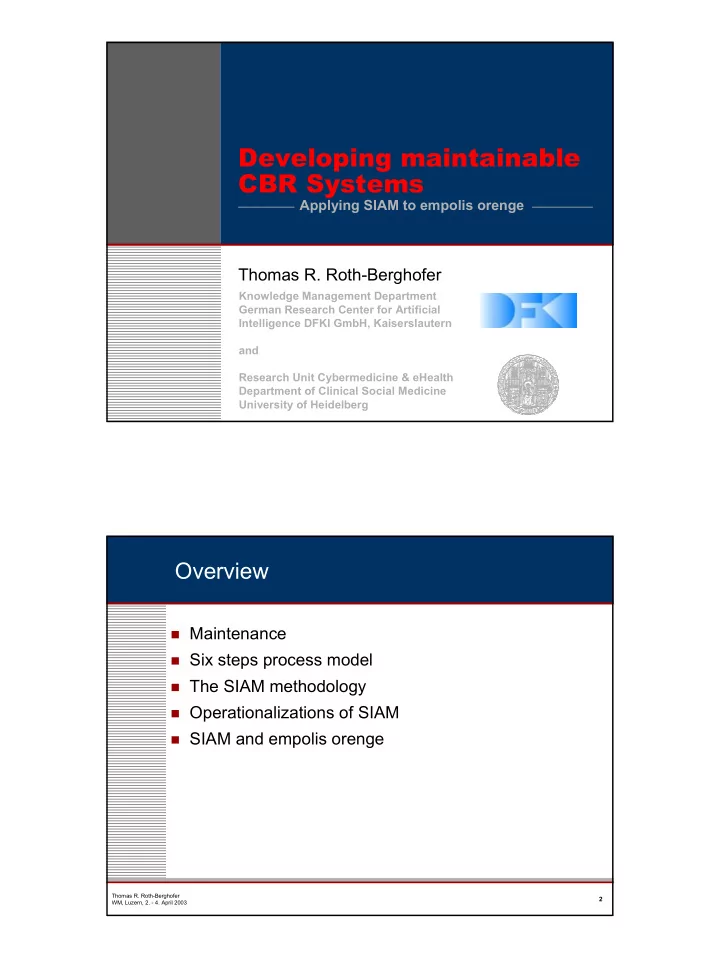

Developing maintainable CBR Systems ___________ Applying SIAM to empolis orenge ____________ Thomas R. Roth-Berghofer Knowledge Management Department German Research Center for Artificial Intelligence DFKI GmbH, Kaiserslautern and Research Unit Cybermedicine & eHealth Department of Clinical Social Medicine University of Heidelberg Overview � Maintenance � Six steps process model � The SIAM methodology � Operationalizations of SIAM � SIAM and empolis orenge Thomas R. Roth-Berghofer 2 WM, Luzern, 2. - 4. April 2003
Main idea Perfect system Control Repairs Defects loop Imperfect system Thomas R. Roth-Berghofer 3 WM, Luzern, 2. - 4. April 2003 Knowledge structure (Richter 1995) Vocabulary Case base Similarity Adaptation measures knowledge y V r o a l c u a b b a u c l o a r V y Richter, 1995 Thomas R. Roth-Berghofer 4 WM, Luzern, 2. - 4. April 2003
The six steps process model (Reinartz, Iglezakis, Roth-Berghofer 2001) Maintenance Phase Application Phase Application Phase Knowledge Problem Problem Retain Retrieve Retrieve Knowledge knowledge Knowledge Knowledge Review Reuse Reuse containers' containers' containers containers Restore Revise Revise Thomas R. Roth-Berghofer 5 WM, Luzern, 2. - 4. April 2003 The control loop revisited CBR system at time t´´ CBR system at time t Retrieve Retrieve Knowledge Knowledge Retain Retain Reuse Reuse containers containers Revise Revise = repair defect(s) Restore Review CBR system at time t´ Retrieve Knowledge Retain Reuse containers Revise Thomas R. Roth-Berghofer 6 WM, Luzern, 2. - 4. April 2003
The four phases of SIAM 1 1 1 S ETUP S ETUP S ETUP I NITIALIZATION I NITIALIZATION I NITIALIZATION 2 2 2 M AINTENANCE A PPLICATION A PPLICATION 4 3 3 INRECA Thomas R. Roth-Berghofer 7 WM, Luzern, 2. - 4. April 2003 Possible Operationalizations � Maintenance manual - Planning and Scheduling of maintenance tasks - Supporting the execution of maintenance tasks by giving concrete advice � Maintenance Management System - Implementation of the maintenance phase - Workflow support Thomas R. Roth-Berghofer 8 WM, Luzern, 2. - 4. April 2003
Maintenance rules timer event Timer knowledge or information Review Restore item New item solution quality event Feedback Event Condition Action Thomas R. Roth-Berghofer 9 WM, Luzern, 2. - 4. April 2003 Maintenance manual: Overview 5.23 Compile a list of 5.1 Compute usage of 5.2 Monitor rarely 6.1 Remove 6.8 Add unknown words 5.1 Compute usage of 5.2 Monitor rarely unknown words 6.1 Remove cases accessed cases documents contained in queries cases accessed cases documents 5.25 Monitor unknown words 6.9 Modify valuation 5.24 Compile a list of 5.3 Compute usage of 5.4 Monitor rarely 6.2 Add new case model (suggested concepts used concepts unknown words contained in documents similarities) 5.3 Compute usage of 5.4 Monitor rarely 6.2 Add new case 5.5 Compute rarely 5.6 Monitor rarely and concepts used concepts and frequently asked frequently asked 6.10 Handle redundant 5.26 Compute 5.27 Monitor redundant queries queries redundancy of cases cases cases 5.7 Compute retrieval 5.5 Compute rarely 5.8 Monitor retrieval 5.6 Monitor rarely and accuracy for all cases 5.29 Monitor 6.11 Handle accuracy 5.28 Compute of the case base and frequently asked frequently asked consistency of cases inconsistent cases inconsistent cases queries queries 5.9 Compile a list of 5.10 Monitor retrieval 6.3 Modify valuation retrieval results results model 5.31 Monitor not 6.12 Handle not 5.30 Compute minimality of cases minimal cases minimal cases 5.7 Compute retrieval 5.8 Monitor retrieval 5.11 Compute filling 5.12 Monitor filling accuracy for all cases level of valuation level of valuation accuracy of the case base model model 5.33 Monitor not 6.13 Handle not 5.32 Compute incoherence of cases incoherent cases incoherent cases 5.13 Compute 5.14 Monitor the frequency distribution frequency distribution 5.9 Compile a list of of concepts of concepts 5.10 Monitor retrieval 6.3 Modify valuation 6.14 Remove expired retrieval results results model documents 5.15 Compile a list of 5.16 Monitor new 6.4 Modify completion 5.34 Compile a list of expired documents new concepts concepts rule model 6.15 Set new expiration 5.11 Compute filling 5.12 Monitor filling date 5.17 Compile a list of 5.18 Monitor deleted level of valuation level of valuation 6.5 Modify data model deleted concepts concepts model model 5.36 Monitor retrieval 5.35 Check retrieval 6.16 Shorten retrieval time time time 5.20 Monitor user feedback (wrong 5.13 Compute 5.14 Monitor the retrieval results) 6.6 Modify analysis frequency distribution frequency distribution 5.38 Monitor case base model 5.37 Check case base 6.17 Shorten case base building time 5.21 Monitor user of concepts of concepts building time building time 5.19 Check user feedback (missing feedback cases) Review Restore 5.15 Compile a list of 5.16 Monitor new 6.4 Modify completion 5.22 Monitor user 6.7 'Teach' users feedback (erring user) new concepts concepts rule model Review Restore Thomas R. Roth-Berghofer 10 WM, Luzern, 2. - 4. April 2003
orenge:ProcessManager � “Pipelets” provide existing orenge:Services such as - Textminer - Completion - Retrieval - Adaptation � Customizable pipelets - Review - Restore Thomas R. Roth-Berghofer 11 WM, Luzern, 2. - 4. April 2003 Knowledge structure of empolis orenge Classes and Vocabulary concepts (OMML), OOML case Keys (OAML) base, Index, SQL database Case base Similarity Adaptation measures knowledge y V r o a l c u a b b a Adaptation u c l o a Orderings, similarity r V y rules (ORML) tables, and taxonomies (OVML), Richter, 1995 Completion rules (ORML) Thomas R. Roth-Berghofer 12 WM, Luzern, 2. - 4. April 2003
Thank you! Thomas R. Roth-Berghofer 13 WM, Luzern, 2. - 4. April 2003
Recommend
More recommend